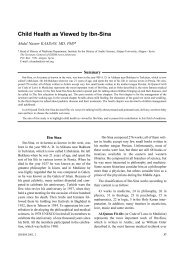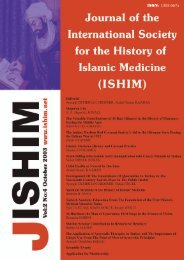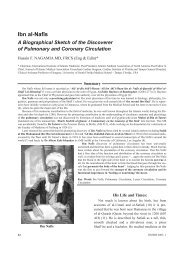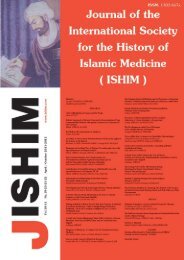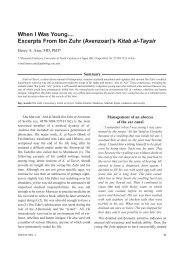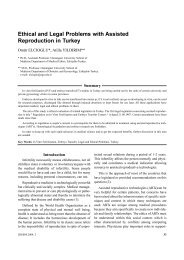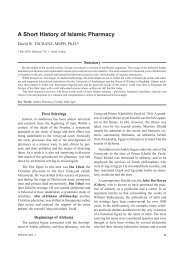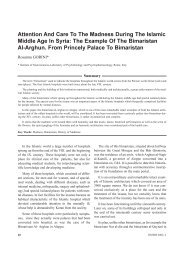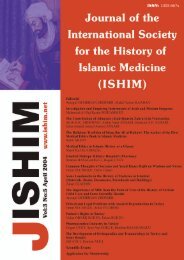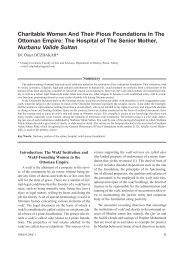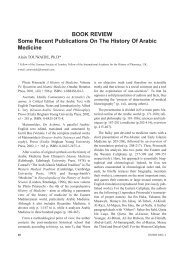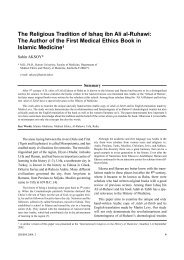Journal - International Society for the History of Islamic Medicine
Journal - International Society for the History of Islamic Medicine
Journal - International Society for the History of Islamic Medicine
Create successful ePaper yourself
Turn your PDF publications into a flip-book with our unique Google optimized e-Paper software.
Sharif Kaf Al-GHAZAL THE INFLUENCE OF ISLAMIC PHILOSOPHY AND ETHICS ON THE<br />
DEVELOPMENT OF MEDICINE DURING THE ISLAMIC RENAISSANCE<br />
laying in bed. There<strong>for</strong>e, <strong>the</strong>se hospitals had to provide<br />
<strong>the</strong> patients and employees with plentiful <strong>of</strong><br />
clear water supply and with bathing facilities.<br />
e. Practicing physicians: Only qualified physicians<br />
were allowed by law to practice medicine. In<br />
931 A.D., <strong>the</strong> Caliph Al-Mugtadir from <strong>the</strong> Abbasid<br />
dynasty, ordered <strong>the</strong> Chief Court-Physician Sinan<br />
Ibn-Thabit to screen <strong>the</strong> 860 physicians-<strong>of</strong> Baghdad,<br />
and only those qualified were granted license to practice.<br />
It is worth mentioning also that <strong>the</strong> physicians in<br />
that era earned a high prestige. Although anyone,<br />
irrespective <strong>of</strong> his social status, can study medicine,<br />
yet <strong>the</strong> route was long and tedious. He had to finish<br />
<strong>Islamic</strong> studies, philosophy, astronomy, art, chemistry,<br />
etc. be<strong>for</strong>e being accepted as a medical student.<br />
There<strong>for</strong>e, <strong>the</strong> physician was an an educated person<br />
who had wisdom and knowledge. In fact, <strong>the</strong> Arabic<br />
translation <strong>of</strong> a physician is "Hakim" which means<br />
sage. In <strong>the</strong> 9th and 10th century, <strong>the</strong> Court-<br />
Physician was in <strong>the</strong> protocol ahead <strong>of</strong> <strong>the</strong> Chief-<br />
Justice. Many eminent physicians, as we will discuss<br />
later, showed enough talent, social knowledge, political<br />
capabilities, and wisdom to be appointed by <strong>the</strong><br />
Caliphs as prime ministers. Owing to <strong>the</strong> high prestige<br />
and connections <strong>of</strong> physicians, generous funds<br />
<strong>for</strong> hospitals were easily obtained.<br />
f. Medical Regulation: Be<strong>for</strong>e <strong>the</strong> Muslims, medicine<br />
had been an unregulated pr<strong>of</strong>ession, where one<br />
could easily fall into <strong>the</strong> hands <strong>of</strong> an unqualified doctor.<br />
However, <strong>the</strong> Muslims' introduction <strong>of</strong> regulation<br />
ensured that all doctors were qualified . Prophet<br />
Mohammad (PBUH) said (He who practices medicine<br />
and is not <strong>the</strong>rein versed is deemed like a guarantor).<br />
The regulations also ensured that doctors did<br />
not cheat <strong>the</strong>ir patients when it came to drug composition.<br />
This concept affected <strong>the</strong> Renaissance's physicians<br />
<strong>for</strong> it set an example <strong>for</strong> <strong>the</strong>m, leading <strong>the</strong>m to<br />
found various medical associations and guilds <strong>for</strong> <strong>the</strong><br />
purpose <strong>of</strong> regulating <strong>the</strong>ir pr<strong>of</strong>ession too . Hence,<br />
one could say that <strong>the</strong> Muslims' regulation <strong>of</strong> medicine<br />
lead to a safer and more pr<strong>of</strong>essional medical<br />
institution during <strong>the</strong> Renaissance, which doubtlessly<br />
saved countless lives that would have been lost due to<br />
medical incompetence.<br />
g. Ra<strong>the</strong>r medical schools: The hospital was not<br />
only a place <strong>for</strong> treating patients, but also <strong>for</strong> educat-<br />
ing medical students, interchanging medical knowledge,<br />
and developing medicine as a whole. To <strong>the</strong><br />
main hospitals, <strong>the</strong>re were attached expensive<br />
libraries containing <strong>the</strong> most up-to-date books, auditoria<br />
<strong>for</strong> meetings and lectures, and housing <strong>for</strong> students<br />
and house-staff.<br />
h. Rulers' involvement in building hospitals: The<br />
Caliphs <strong>of</strong> <strong>the</strong> <strong>Islamic</strong> empire built magnificent hospitals<br />
<strong>for</strong> religious reasons, as Islam teaches that<br />
money spent on charity is a good investment <strong>for</strong><br />
Judgment Day; and <strong>for</strong> political reasons when <strong>the</strong>y<br />
showed <strong>the</strong>ir people that <strong>the</strong>y cared, and were interested<br />
in <strong>the</strong>m. Whatever <strong>the</strong> motive <strong>of</strong> <strong>the</strong> ruler, <strong>the</strong><br />
population benefited and good hospitals were established.<br />
i. Adequate financing to run <strong>the</strong> hospitals: The<br />
rulers set aside generous funds to run <strong>the</strong>se hospitals.<br />
There was a special system called Al-Waqf. A person<br />
can donate part or all <strong>of</strong> this wealth to charity. The government<br />
takes care <strong>of</strong> such a donation, and its revenues<br />
help to maintain and build mosques, hospitals, and<br />
schools. Ano<strong>the</strong>r source <strong>of</strong> funds and an important pillar<br />
<strong>of</strong> Islam is Al-Zakat (2.5% <strong>of</strong> property value).<br />
Thus, <strong>the</strong> main Arabian hospitals were models <strong>for</strong><br />
medieval hospitals built later in Europe. They were<br />
6 JISHIM 2004, 3



